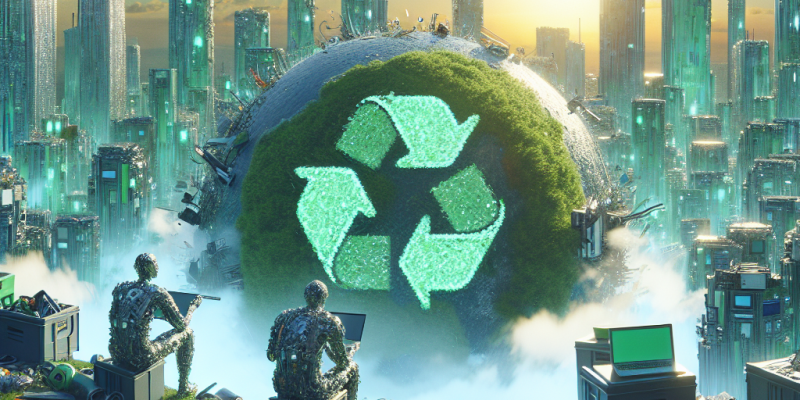E-Waste Crisis: Tech Giants Tackle Sustainability in 2024

E-Waste Crisis: Tech Giants Tackle Sustainability in 2024
As we plunge deeper into the digital age, one of the most pressing challenges we face is the growing crisis of electronic waste, commonly known as e-waste. By 2024, the global production of e-waste is projected to reach an astonishing 74 million metric tons, sparking urgent calls for action from governments, environmental organizations, and—most crucially—tech giants themselves. In response to this escalating crisis, the world’s leading technology companies are stepping up their commitments to sustainability and responsible resource management.
Understanding the E-Waste Crisis
Electronic waste encompasses discarded electrical or electronic devices, including computers, smartphones, televisions, and home appliances. The rapid pace of technological advancement often leads to short product lifespans, creating a surge in discarded electronics. E-waste poses significant environmental and health risks, as many of these devices contain hazardous substances such as lead, mercury, and cadmium. When improperly disposed of, e-waste can contaminate soil and water, threatening ecosystems and human health.
The United Nations has raised alarms, rightly noting that less than 20% of the world’s e-waste is recycled correctly. The rest often ends up in landfills or is processed in unsafe conditions in developing countries. This alarming statistic underscores the need for a systemic overhaul in how we produce, consume, and dispose of electronic products.
Tech Giants Answering the Call
In 2024, several tech companies have made significant strides toward addressing the e-waste crisis by adopting sustainable practices and circular economy principles:
-
Apple: Apple has long been a leader in sustainability initiatives, announcing its goal of achieving carbon neutrality across its entire supply chain by 2030. The company continues to invest in innovative recycling technologies, such as the "Daisy" robot, which disassembles iPhones to recover valuable materials. In 2024, Apple introduced a take-back program that incentivizes customers to return old devices for recycling, offering discounts on new products in exchange.
-
Samsung: Samsung has pledged to use 100% recycled materials in its packaging by 2025 and has partnered with local governments to set up designated e-waste recycling points. The giant’s new "Galaxy for the Earth" initiative promotes consumer awareness about recycling while also exploring eco-friendly designs that minimize environmental footprints.
-
Google: Google has committed to a bold goal of producing all of its devices from recycled materials by 2025. The company has rolled out a new initiative to provide trade-in options for Pixel smartphones, simplifying the recycling process for consumers. Furthermore, Google is working on an advanced machine-learning technology that optimizes the recycling process by identifying components that can be reused.
-
Microsoft: Microsoft is relentless in its pursuit of sustainability, aiming to become carbon negative by 2030. The company has launched a "Device as a Service" model, allowing customers to lease devices rather than purchase them outright. This model encourages proper maintenance, repair, and eventual recycling of electronics, promoting a circular economy.
- Dell: Dell leads the way with its circular economy approach, focusing on responsible sourcing and recycling efforts. The company recently announced a new program entitled "Dell Technologies Circular Economy Playbook," sharing best practices and guidelines for other organizations to follow in order to create a more sustainable tech industry.
Collaborative Efforts and Innovations
In addition to their individual commitments, tech giants are increasingly recognizing the power of collaboration. Initiatives such as the E-Waste Alliance, formed in early 2024, bring together major players like Apple, Samsung, and Lenovo, pooling resources and expertise to develop standardized recycling methods and awareness campaigns aimed at consumers worldwide.
Innovative technologies are also being harnessed to combat e-waste. Companies are investing in research to develop biodegradable components and explore new materials that minimize environmental impacts. Furthermore, advancements in artificial intelligence and robotics are being utilized to improve sorting and processing techniques, streamlining recycling efforts globally.
Consumer Responsibility and Awareness
While tech giants are making strides, the responsibility does not lie solely on their shoulders. Consumers play a crucial role in minimizing e-waste. Awareness campaigns by companies and environmental organizations are vital in educating the public about proper disposal methods, recycling programs, and the importance of making informed choices when purchasing electronic devices.
Conclusion
The e-waste crisis represents one of the most significant environmental challenges of our time, but the tides are turning. In 2024, as tech giants rise to the occasion with robust initiatives and innovations, a new era of sustainability is on the horizon. By embracing circular economy practices, technology companies can help pave the way toward a more responsible and sustainable future—one that balances technological advancement with environmental stewardship. Through collaborative efforts and consumer engagement, we can work towards a world where e-waste is managed responsibly, and valuable resources are preserved for generations to come.














